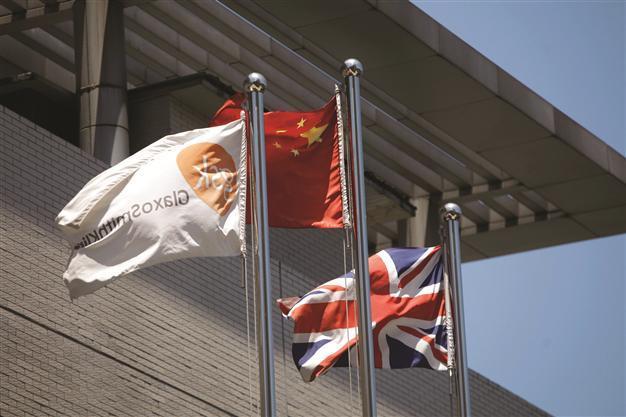British GSK says senior executives appear to have broken Chinese law
LONDON/ SHANGHAI - Reuters

A flag (L) bearing the logo of GSK flutters next to a Chinese national flag (C) and a United Kingdom flag, outside a GlaxoSmithKline office building in Shanghai. REUTERS photo
British drugmaker GlaxoSmithKline said July 22 that some of its executives in China appeared to have broken the law in a bribery scandal while proposed changes to the firm’s business model would lower the cost of its medicine in the country.
GSK is the latest in a string of multinationals to be targeted by Chinese authorities over alleged corruption, price-fixing and quality controls.
Chinese police visited the Shanghai office of another British drugmaker, AstraZeneca, a company spokeswoman said. The police came on July 19 and took away one employee for questioning, she said, without giving further details.
No tolerance for law breakingGSK’s head of emerging markets, Abbas Hussain, said the company had zero tolerance for employees who broke the law.
“Certain senior executives of GSK China, who know our systems well, appear to have acted outside of our processes and controls, which breaches Chinese law,” he said in a statement.
Hussain, sent to China last week to lead GSK’s response to the crisis, held a meeting with the Ministry of Public Security at which he also promised to review GSK’s business model.
“Savings made as a result of proposed changes to our operational model will be passed on in the form of price reductions, ensuring our medicines are more affordable to Chinese patients,” Hussain added.
The company gave no details on the changes or the extent of price cuts. GSK supplies key products such as vaccines in China, as well as drugs for lung disease and cancer.
Chinese police last week accused GSK of bribing officials and doctors to boost sales and raise the price of its medicines.
They said GSK transferred up to 3 billion yuan ($489 million) to 700 travel agencies and consultancies over six years to facilitate the bribes. Four senior Chinese executives from GSK have been detained.
Britain’s biggest drugmaker has said it was deeply concerned by the allegations, which it called “shameful”.
Last week, Chinese authorities also visited the Shanghai office of Belgian drugmaker UCB. A UCB spokesman said the visit was part of a wider investigation that included other drug companies, although he did not identify them.
In a statement, China’s Ministry of Public Security said Hussain apologised for the scandal during the meeting.
He was dispatched to China by Chief Executive Andrew Witty, along with the group’s global head of internal audit and a senior legal official, a person familiar with the matter said on July 19.
Witty will detail what action the drugmaker is taking in response to the bribery allegations when he presents quarterly results on Wednesday, sources said.
The company has run into problems despite conducting up to 20 internal audits in China each year, resulting in the sacking of dozens of staff for misconduct. In 2012, GSK dismissed 312 staff for policy violations worldwide, according to its annual Corporate Responsibility report, of which 56 were in China.
Despite the crisis, the company’s shares have held up - reflecting the fact that China accounts for only around 3 percent of sales.
GSK to cut drug pricesGSK’s intention to cut the price of its medicines in China would be in line with how other foreign companies have responded to pressure from Beijing.
European food groups Nestle and Danone said they would cut infant milk formula prices in China after Beijing launched an inquiry into the industry.
“In China, when the government criticises people, they tend to bow down and apologise very quickly because they are scared of the authority of the central government to do tremendous harm to their business - whether it be for arresting executives very quickly or through auditing,” said Shaun Rein, managing director of the Shanghai-based China Market Research Group.
